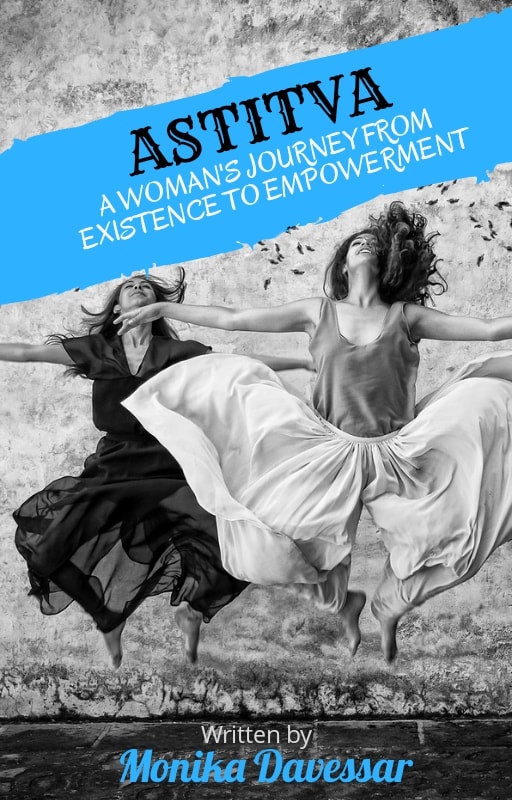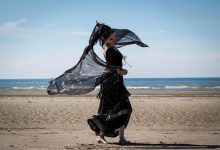
As much as I have been enjoying getting to know some amazing authors in the past week, nothing gives me more pleasure or pride than speaking to a fellow Feminist. I’ve been more than surprised to know that a lot of people refrain from being called Feminists even though they say they believe in the principle of equality and also advocate it. This has been a huge bone of contention for me. And what better way than to ask an author with a strong voice to clear the air about the real meaning of Feminism? I am extremely thrilled to introduce…Monika Davessar.
Monika Davessar loves learning new things and blogging is her recent interest. Her book ‘Astitiva’ is a collection of poignant yet powerful stories centring around women empowerment. As a writer, she gets emotionally invested in her stories and as she will reveal later, one of them even got her teary-eyed. So without any further ado, let us get to know Monika better.

Author’s Note: I do not have any one favorite author. I appreciate whatever I read because everything the other people write is a representation of some aspect of life. Reading how different people write, balances, modifies, enlarges and enriches one’s own vision of life. Any good story in a newspaper or any good article in a magazine attracts and enriches me as a thinker and writer. A closer observation of life is my basic source of inspiration. I learn a lot from how people live, love, struggle and enjoy their lives.
Interview
- Your book condemns practices in our society that are oppressive towards a woman. You’ve spoken about abuse, gender equality, queer rights etc. in the book. What are your thoughts on Feminism?
A: Feminism is not anti-male. Feminism respects the distinct qualities of the male sex and appreciates their unique role in the social set-up. Feminism is, in fact, an assertion of a female’s distinct identity. It insists upon equal opportunities and space to women to choose their course in life and live their life the way they want to in tune with their sensibilities and aspirations within, of course, the moral framework acceptable to the society.
- You have incorporated story-telling to highlight women’s issues. Do you think stories have a bigger impact than an article?
A: Generalized, abstract ideas do not convey a message as effectively as an example chosen from real life does. A story concretizes the message, creates an image and a vision that is stronger and longer-lasting. Readers start relating themselves to the plot or the character in the story rather than abstract writing which is similar to attending the class of a boring teacher. Don’t you still remember and miss your school teacher who used to make the subject interesting using stories or some other interesting medium?
- Other than reading and writing, what should a writer do to improve their storytelling?
A: Often, a story is not just a product of a writer’s imagination. It is born out of an actual experience of life, maybe the writer’s own or an observed one. Although a writer has to add a few details on her own to dramatize the event and to give it a literary colour and make it acceptable to the reader. So all that a writer needs to do to improve her story-telling is to observe life more closely and honestly so that the story does not depart from the truth.
- Do you think short stories are a safer bet as compared to novellas or full-blown novels?
A: Stories are short literary forms and thus convey their message immediately and precisely. What the reader enjoys in a novel is the larger canvas, characterization and the beauty of language. A novel does not necessarily convey a message. It presents a vision of life. Moreover, during the present era of hectic lifestyle, TV and mobile, very few people have the patience and time to read a novel that may take several days to finish. A story can be finished in one sitting.
- Describe the most difficult story/ plot/ character/article that you have written and why?
A: “ Domestic Violence” – where I depicted the plight of an infant girl, was my most difficult story because of the complexities of characterization. I could actually feel her suffering as I was writing and it put me in tears too. But I think from a reader’s perspective, I failed to adequately put her suffering into words. It is a limitation I often experience as a young writer in the making. I hope my writing will gain strength as I continue to write.
- Tell us how you found your voice (a strong one at that!) as a writer? Tell us about the women in your life/ icons of the world who have inspired you to become a woman with strong opinions?
A: By nature, I felt inclined to closely observe the life of women around me, particularly common women like maids, sweepers, peons or even educated working women who have a glamorous exterior but are burdened within. They have huge responsibilities to discharge in their places of work but are denied at home the rest and relief that they so well deserve. This is because the male member/ s of the family don’t allow her to be free from the conventional responsibilities that have throughout been her fate. These common women have been my icons and my source of inspiration to write.
- If you had to describe yourself in three words, what would they be?
A: 1. Sensitive 2.Straightforward 3.Rebellious
- How do you overcome Writer’s Block?
A: The noted novelist V.S. Naipaul once wrote: For months I do not write anything because during those months I experience “ intellectual drought.” What we call a writer’s block is, in fact, not a mental block but a lack of some powerful idea. The writer should, therefore, wait patiently for a powerful idea to grow in her head. When such an idea is born and grows, what we call a writer’s block evaporates like thin air. Expression ceases to be a problem; the idea spontaneously flows out.
- Describe your process for research while writing.
A: My initial motivation came after reading the book titled “ The Second Sex” by Simone De Beauvoir. I had got the book from one of my close uncle’s book collection. My research does not happen in a library. It happens in the larger arena of life. I learn things from TV, newspaper, magazines, people, events and even personal contemplation. An honest and closer observation of life is the key to my research. It provides me with enough potent material for writing.
- Share some valuable tips for publishing and marketing an eBook.
A: Good content will always have a ready market. Good content does not mean only the idea or the message. It equally means the beauty of characterization, the beauty of language, the appropriateness of details. An eBook should have trending keywords; the book cover should be attractive; the Foreword should be written, if possible, by some established writer. You should promote your book on social media on different platforms and in different communities, as I am doing here on #authorchatter too. Last but not least, it should be reasonably priced in the beginning as your first concern should be good valuable readers and not money.
eBook

Book Blurb:
‘Astitva’ is a virtual revolt against the age-old customs and attitudes that suppress the essential identity and dignity of women. The author pushes all women suffering under the present societal set-up to realize their potential and live independently.
I really hope that you download and enjoy this wonderful book by this amazing author. A review of her book by fellow blogger and author, Romila could help you make up your mind about the book. Find Monika on Goodreads as well.
Hope your work is appreciated by many, Monika! Heartfelt best wishes for your eBook and all your future endeavours.
Did you enjoy this interview, @sharealubhujia? How was it for you, the readers? Do comment and let me know thoughts.
On Anshu’s blog today you can meet Ravish Mani who speaks to her about his Audiobook ‘Break Free the Leader Within’, while Priya has a virtual tete a tete with the author of ‘India or US’, Jayanthi.
This interview is a part of a series conducted jointly by @anshuwrites, @priyreflects and me. I had a lot of fun interacting with Arjun Gupta, Rashi Roy, Tomichan Matheikal, Varad , Saba, Kanika G and Neha Tambe as well. In case you haven’t caught those interviews, please do so and share your thoughts! Our aim is that each one of you finds something to take away from the honest and heartfelt experiences shared by the authors. 🙂


 Labels that make me, me: #FreelanceWriter #Instawriter #Blogger #Narcissisticabuse survivor #HighlySensitivePerson (#HSP) #Empath #Introvert #Feminist
Labels that make me, me: #FreelanceWriter #Instawriter #Blogger #Narcissisticabuse survivor #HighlySensitivePerson (#HSP) #Empath #Introvert #Feminist




Recent Comments